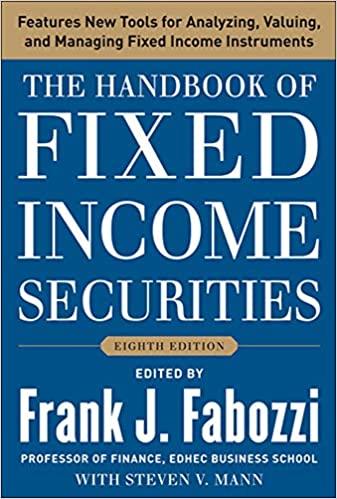Question
Consider two securities A and B. A pays an expected cashflow of 10 at time 1, 3, 5, and 10. Then, A pays an expected
Consider two securities A and B.
A pays an expected cashflow of 10 at time 1, 3, 5, and 10. Then, A pays an expected cashflow of 20 at time 11, 12, 13, 14,... (perpetuity).
B pays an expected cashflow of 100 at time 2. From time 2 to time 10, this expected cashflow grows at a 2% annual rate (hint: this means that the expected cashflow at time 3 is 102). At time 11, B pays an expected cashflow of 200 and this cashflow grows at an annual rate of 10% (perpetuity).
Security As return volatility is 10%. The correlation between security As return and the market return is 0.6. Security Bs return covariance with the market return is 0.005. The correlation between security Bs return and the market return is 0.3. The risk-free rate is rf = 3%. The market return is 15% with probability 60% and 6% with probability 40%.
Remark: The notation t+ stands for time t right after cashflows have been paid.
(c) (3 points) Compute the covariance between security As return and the market return (AM)
(d) (3 points) Compute the volatility of security Bs return (B)
Step by Step Solution
There are 3 Steps involved in it
Step: 1

Get Instant Access to Expert-Tailored Solutions
See step-by-step solutions with expert insights and AI powered tools for academic success
Step: 2

Step: 3

Ace Your Homework with AI
Get the answers you need in no time with our AI-driven, step-by-step assistance
Get Started


